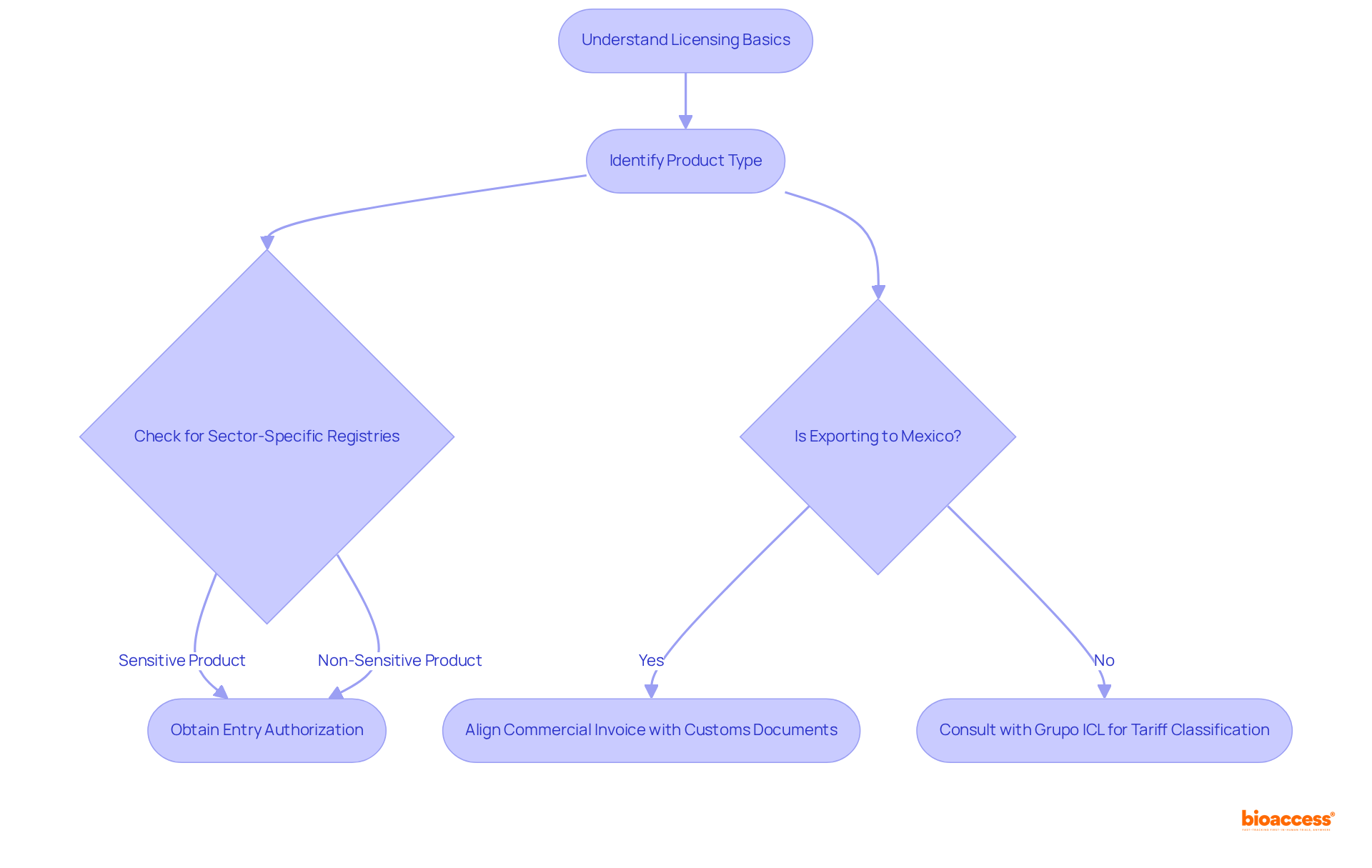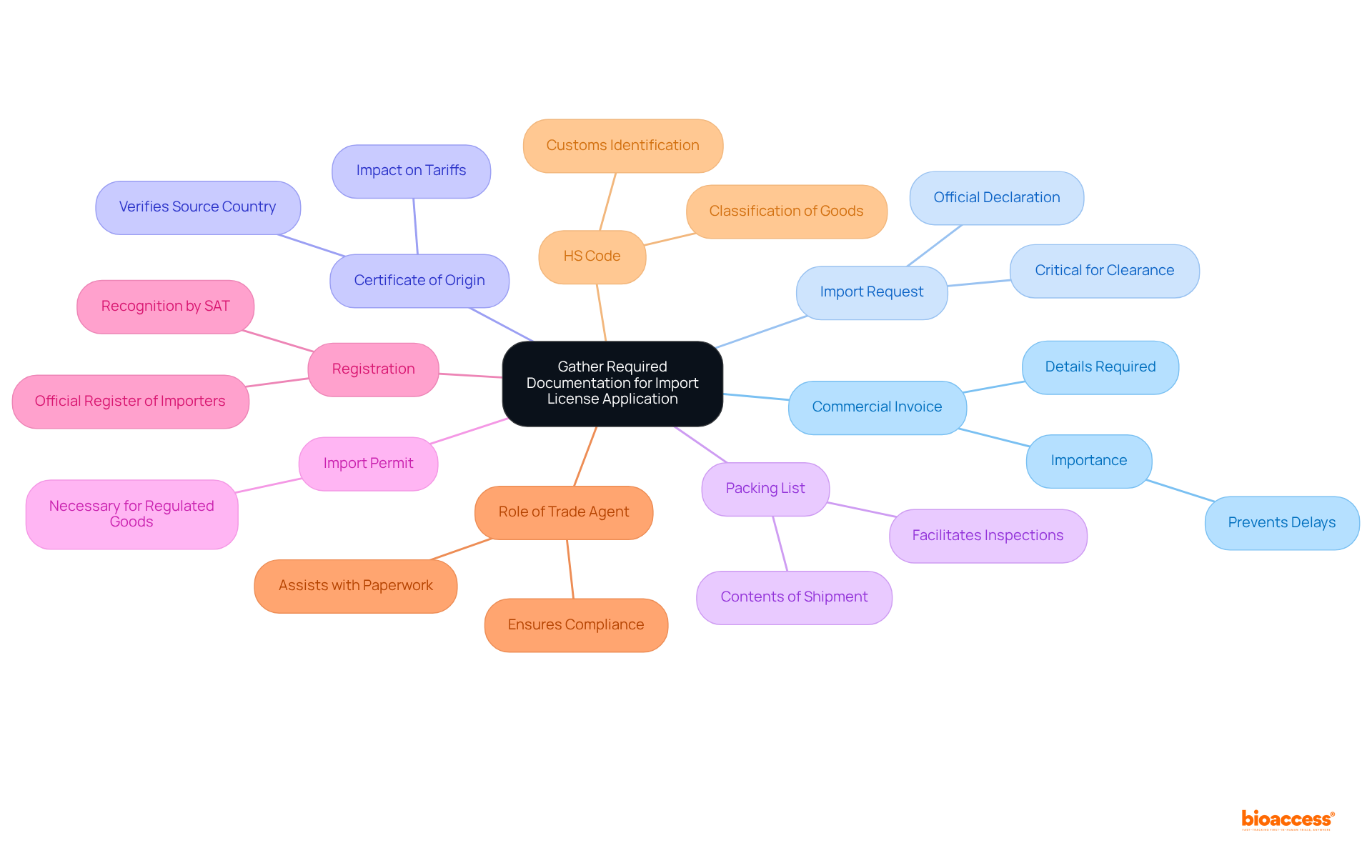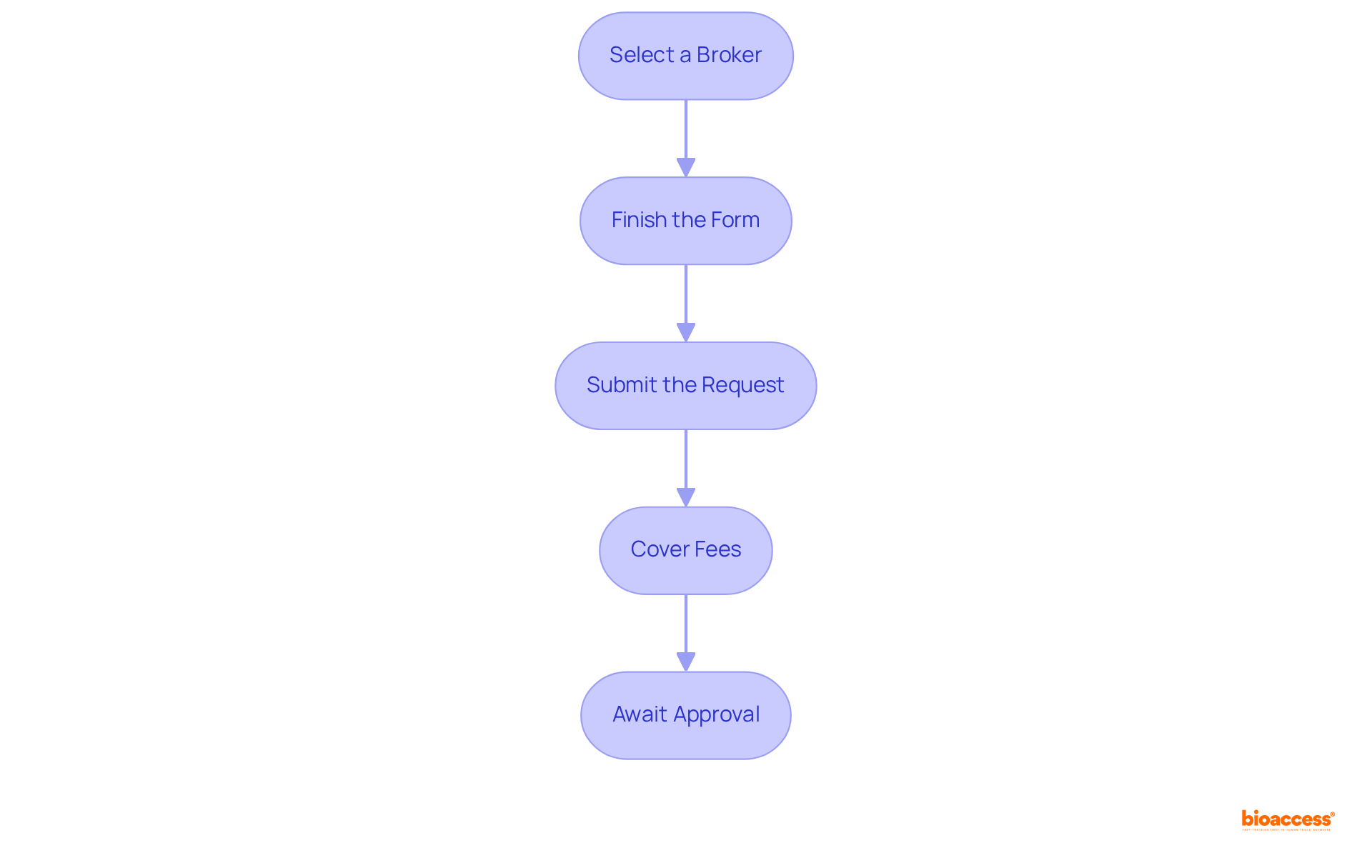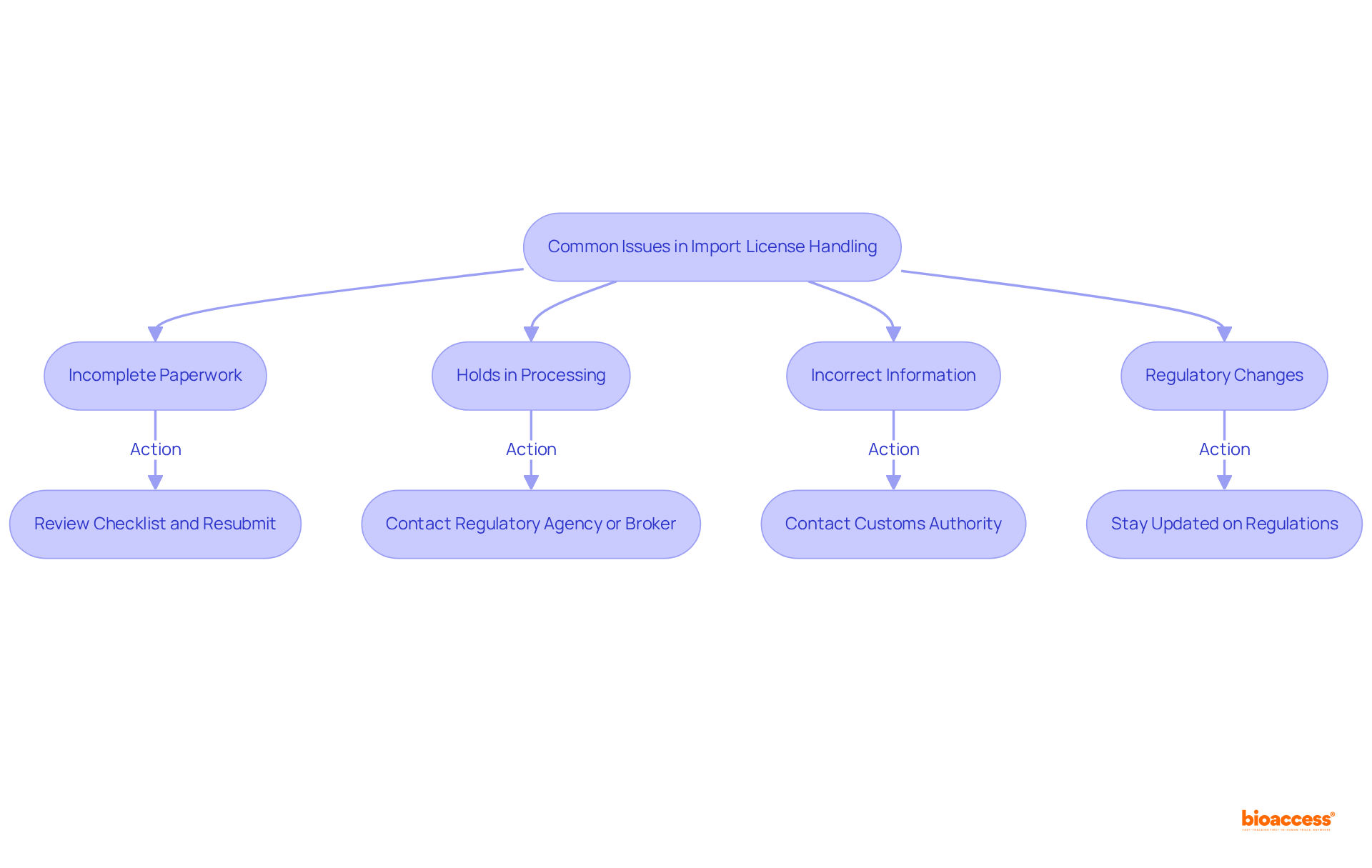


This article delineates a four-step process for the effective handling of contract import licenses in Mexico. It underscores the critical importance of:
Each step is bolstered by comprehensive explanations of the required documents, the pivotal role of customs brokers, and the common challenges encountered during the import license process. This ensures that importers are well-equipped to navigate the complexities of Mexican regulations with efficacy.
Navigating the complexities of import licensing in Mexico presents significant challenges, particularly for businesses striving to comply with stringent regulations. Understanding the essential steps for effective contract import license handling is vital for ensuring smooth operations and avoiding costly delays.
With various documentation requirements and potential pitfalls, how can importers streamline this process while ensuring compliance? This guide provides a clear roadmap for mastering import license handling in Mexico, empowering businesses to confront challenges head-on and optimize their import strategies.
To effectively manage contract import license handling in Mexico, understanding the fundamental concepts of licensing is essential. In Mexico, contract import license handling refers to the official permissions granted by the government, allowing the importation of specific goods into the country. These licenses are particularly necessary for various products that are regulated due to health, safety, or environmental concerns.
Sensitive products may require additional sector-specific registries, while toxic and hazardous products necessitate entry authorization from the Intersecretarial Commission for Process Control and Use of Pesticides, Fertilizers, and Toxic Substances (CICOPLAFEST). It is crucial to familiarize yourself with the types of licenses required for your specific goods, particularly in relation to contract import license handling Mexico, as well as the relevant government agencies involved in the licensing process, such as the Ministry of Economy and the Mexican Customs Authority.
Understanding these basics will facilitate navigation through the subsequent steps more effectively. Furthermore, the commercial invoice must align with merchandise and customs documents to prevent delays. Grupo ICL can assist with tariff classification to avert fines or overcharges, providing valuable support in contract import license handling Mexico and navigating the complexities of entry licenses.

Before submitting your application for contract import license handling Mexico, gathering all required documentation is crucial to ensure a smooth process. The essential documents typically include:
Ensuring that all documents are accurate and complete is essential for facilitating a smooth submission process and avoiding potential delays.

Once you have collected all required documentation, proceed with the contract import license handling Mexico to submit your request. Follow these essential steps:
Select a Broker: Engaging a licensed Mexican trade broker is crucial for contract import license handling Mexico, as shipments without one cannot legally enter Mexico. They will guide you through the contract import license handling Mexico submission process, ensuring compliance with regulations and helping to avoid costly delays. The expertise of a customs broker in contract import license handling Mexico can greatly enhance your shipping operations.
Finish the Form: Accurately complete the contract import license handling Mexico request form, ensuring that all details align with your supporting materials. Minor errors, such as punctuation mistakes, can result in rejection, making attention to detail paramount. Remember, a local corporate signatory and the Mexican Company's Electronic Tax Signature (FIEL) are essential for contract import license handling Mexico and obtaining the import permit.
Submit the Request: Submit your request along with all required documents to the relevant government agency for contract import license handling Mexico. This can typically be accomplished online using your company's electronic tax signature or in person, depending on specific requirements.
Be prepared to cover any fees associated with contract import license handling Mexico for the processing of your request. Retain receipts as proof of payment, as these may be necessary for future reference.
Await approval: After submission, monitor the status of your request regarding contract import license handling Mexico. Processing times can vary, with some applications approved in as little as three business days, while others may take up to 15 business days. Patience and proactive communication with your customs broker can help manage expectations during this period.

Even with meticulous preparation, challenges can arise during the import license handling process. Understanding these common issues and effective troubleshooting strategies is crucial for success.
Incomplete Paperwork: If your submission is rejected due to absent materials, carefully review the checklist to ensure all necessary paperwork is included. Resubmit the request with the complete set of documents to avoid further delays. Remember, incorrect or insufficient import documentation can result in clearance delays, extra expenses, and damage to your business reputation.
Holds in Processing: If your application requires more time than expected, contact the regulatory agency or your broker for updates. They can provide insights into any issues causing the delay, which is crucial since inaccurate or incomplete documentation frequently leads to holdups in international trade.
Incorrect Information: If you identify that incorrect information was submitted, contact the customs authority immediately to rectify the error. Accurate information is essential for compliance; mistakes can lead to additional costs and penalties. As Sarah Lee states, "Businesses can ensure precision and compliance by verifying the accuracy of the information provided, using standardized templates, and maintaining records of all documentation."
Regulatory Changes: Stay updated on any modifications in entry regulations that may affect your request. Regularly check official government websites or consult with your customs broker for updates. Understanding the evolving regulatory landscape is vital for successful importation. Furthermore, possessing a Certificate of Origin (CO) can expedite the license application procedure, facilitating quicker approvals from authorities.
By being proactive and prepared, you can navigate the complexities of import licensing in Mexico more effectively, ensuring a smoother process and minimizing potential setbacks.

Navigating the complexities of contract import license handling in Mexico is essential for successful international trade. This process requires a thorough understanding of import licensing basics, meticulous documentation, accurate application submissions, and effective troubleshooting of potential issues. Mastering these steps streamlines the importation process and ensures compliance with local regulations, ultimately safeguarding your business interests.
Key insights from the article emphasize the critical nature of thorough preparation, which includes collecting essential documents such as:
Engaging a licensed trade broker can significantly enhance the submission process, ensuring that all details are correct and compliant with Mexican customs regulations. Furthermore, proactively addressing common challenges, such as incomplete paperwork or regulatory changes, is crucial for minimizing delays and maintaining a strong business reputation.
In conclusion, effective contract import license handling in Mexico transcends mere procedural adherence; it involves constructing a robust framework that supports smooth operations and compliance. Businesses are encouraged to remain informed about evolving regulations, engage knowledgeable professionals, and uphold meticulous documentation practices. By doing so, they can navigate the intricate landscape of import licensing with confidence and efficiency, leading to successful trade outcomes.
What is contract import license handling in Mexico?
Contract import license handling in Mexico refers to the official permissions granted by the government that allow the importation of specific goods into the country.
Why are import licenses necessary in Mexico?
Import licenses are necessary for various products that are regulated due to health, safety, or environmental concerns.
Are there specific requirements for sensitive products?
Yes, sensitive products may require additional sector-specific registries, while toxic and hazardous products necessitate entry authorization from the Intersecretarial Commission for Process Control and Use of Pesticides, Fertilizers, and Toxic Substances (CICOPLAFEST).
Which government agencies are involved in the import licensing process in Mexico?
The relevant government agencies involved in the import licensing process include the Ministry of Economy and the Mexican Customs Authority.
How can I ensure my commercial invoice aligns with customs documents?
It is crucial to ensure that the commercial invoice aligns with the merchandise and customs documents to prevent delays in the importation process.
How can Grupo ICL assist with import licensing in Mexico?
Grupo ICL can assist with tariff classification to avoid fines or overcharges and provide support in contract import license handling and navigating the complexities of entry licenses.